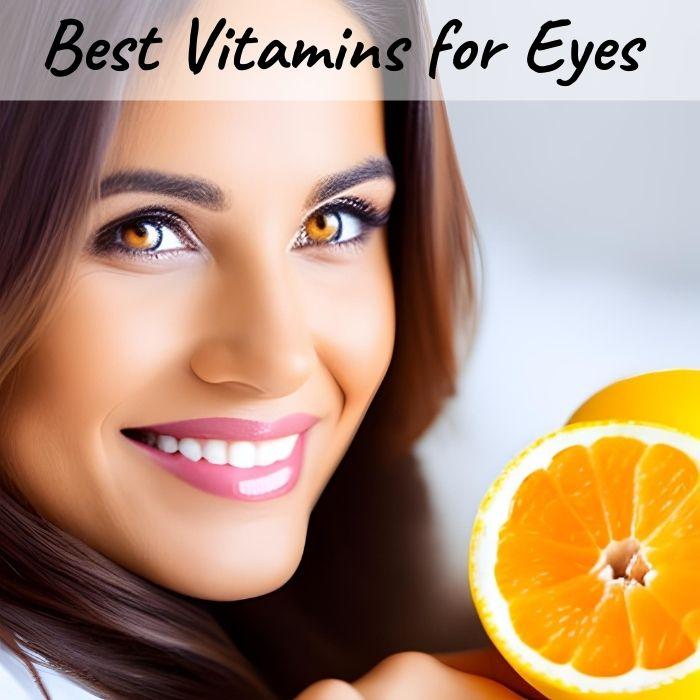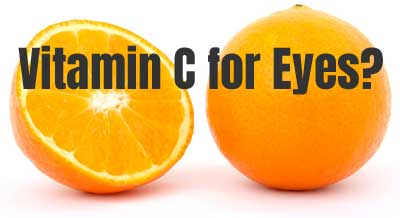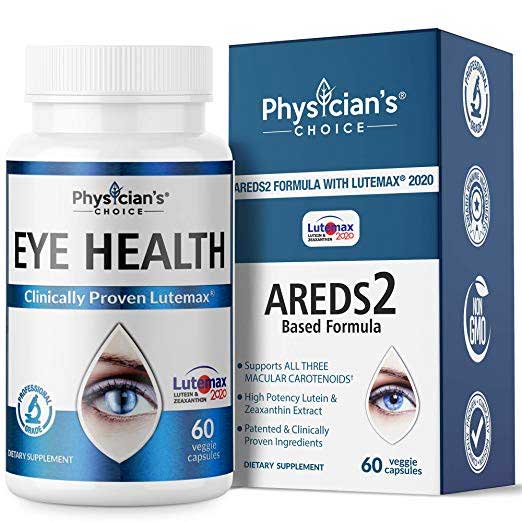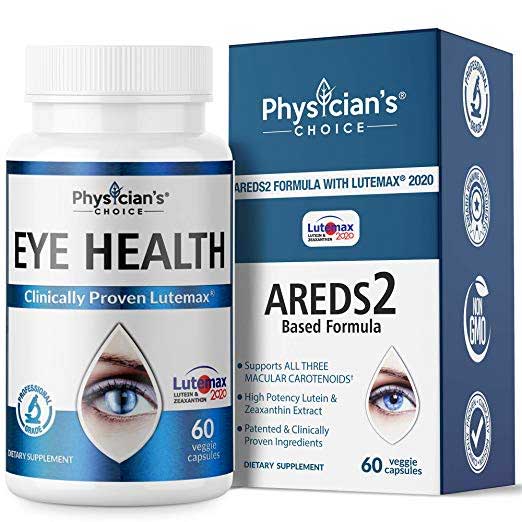
According to Dr Josh Axe, the top vitamins for eyesight include Vitamin C, Vitamin E and Vitamin A, plus lutein, zeaxanthin, zinc and Omega 3 Fish Oil. They show promise for naturally helping a variety of different ailments.
For example, the antioxidants can help circumvent damage from free radicals and thus prevent macular degeneration. In addition, they show to lower the risk for cataracts, reduce glaucoma, eye fatigue, flare and light sensitivity.
Furthermore, they and strengthen eye tissue. Not to mention, they give the body’s immune system an overall boost.
How Does Vitamins C Help Eyesight?

The National Eye Institute discovered that high dose Vitamin C, along with Vitamin E, beta-carotene and zinc reduced the likelihood of AMD by 25% among people at high risk of developing advanced stages of the disease.
In addition, WebMD reports that Vitamin C may delay the onset of cataracts. Although this antioxidant may not prevent the disease entirely, it may be able to slow down its progression significantly. Read more on Vitamin C for Eyes.
Vitamin E & Its Benefits on Vision:
Vitamin E works as an antioxidant by reducing free radical damage and lipid oxidation. Fats are susceptible to oxidation, and since the retina in the eye contains a high concentration of fatty acids, Vitamin E is important for eye health. (Source)
Dry Eyes – Can Omega 3 Fish Oil Help?For instance, scientists believe that cataracts are formed by oxidation in the lens of the eye due to UV rays. Read more on how Vitamin E helps eyes.
Zinc for Eyes:

If you’ve read about the AREDS2 formula for eye health, you’ve noticed that it contains the trace mineral zinc. But how is zinc good for the eyes?
First of all, zinc helps to take Vitamin A from the liver to the retina and produces melanin. Melanin is a pigment that helps protect the eye.
According to the American Optometric Association, zinc deficiency can sometimes lead to poor night vision and cloudy cataracts. Our bodies don’t make this mineral, therefore, we must get it from food or supplementation.
Seafood and red meat provide great sources of zinc, and vegans can get this mineral by consuming tofu, hemp seeds or lentils. If you choose to supplement, on the other hand, take note that high amounts of zinc can interfere with the body’s absorption of copper. (Thus, we see copper added to AREDS supplements.)
By the way, the type of zinc used in the AREDS2 studies was zinc oxide. I don’t know the reason for this, given that zinc gluconate and zinc citrate both have higher absorption rates than the oxide.
Zinc and Dry Eyes:
Some people ask if zinc can help reduce dry, itchy, watery or bloodshot eyes. Omega 3 fatty acids may actually provide more relief because they assist in tear production and reducing inflammation on the eyelid.
In other words, eat more fish to keep your eyes healthy. Plus, seafood gives you the double bonus of providing a significant amount of zinc at the same time. =)
How Does Omega-3 Fish Oil Help Eyesight?
According to Harvard Medical School, omega-3 fatty acids DHA and EPA protect cells in the retina. In addition to possibly decreasing the risk of macular degeneration, they keep the eyes lubricated in people with dry eye syndrome. Read more about omega 3 for eyes.
What About Beta Carotene for Eyesight & Eye Health?
According to Dr Winkelstein, Doctor of Optometry at Temecula Valley Optometry, Vitamin A helps protect the cornea, or the eye’s surface. Thus, it can decrease the occurrence of ocular infections as well as prevent corneal ulcers and dry eyes.
Vitamin A actually gets converted from the carotenoid beta carotene once consumed. That explains why we sometimes find beta carotene in vision supplements.

However, beta carotene has shown to increase lung cancer risk in smokers. Therefore, the AREDS2 eye vitamin formulation switched out the carotenoid for lutein and zeaxanthin. (Source)
Alternatively, if you want to get beta carotene through food instead of supplements, increase your consumption of orange-colored foods. For instance, raw carrots, cantaloupe melon, pumpkin and sweet potatoes all contain high amounts of this carotenoid.
Vitamin A eye drops can effectively treat dry eye syndrome. In addition, when combined with lutein, this nutrient may help to slow vision loss in patients with retinitis pigmentosa.
Furthermore, Beta Carotene (or Vitamin A) has shown to have a positive impact on moderate to advanced AMD. However, it was later replaced with lutein and zeaxanthin as part of the AREDS2 formulation.
Although it had a healthy effect on eyes, Vitamin A can produce potential unwanted side effects for some people.
Do you want vitamins that can help your eyesight, including eye floaters and strain from looking at a computer screen? Physicians Choice Eye health has developed a unique supplement around the AREDS 2 formula, plus high-concentrate antioxidants to strengthen aging eyes.
Ingredients in Physician’s Choice Eye Formula:
- Lutemax 20/20: Marigold extract the provides 3 macular carotenoids (including zeaxanthin) that support eye health.
- Lutein: May filter light in retina an therefore protect eyes from damaging light.
- Bilberry Fruit Extract: Antioxidants that support blood flow to the retina. In addition, Bilberry may refine night vision by helping eyes adapt to the dark.
- Vitamin C: Can help strengthen blood vessels as well as boost the immune system.
- Vitamin E: Helps protect eyes from free radicals, and their damage to eye tissue.
- Folate: may decrease risk and slo progression of age-related eye diseases.
- Vitamin B12
- Zinc: Transports Vitamin A from the liver to the retina to produce melanin.
- Copper: The body requires copper to develop melanin, which gives eyes their color.
- Grape Seed Extract: Strengthens capillaries, thus protecting eyes from toxins.
- Proanthocyanidin Extract: May protect retina from diabetic injury or hyperglycemic damage.
- Black Pepper Fruit Extract (Bioperine): Increases absorption of supplement nutrients.
- Microcrystalline Cellulose (plant fiber)
- Hydroxypropyl Methylcellulose (vegetarian capsule)
- Magnesium Stearate (vegetable source)
In fact, studies have shown that ingredients contained can help with vision as well as sleep quality. For example, it helps to minimize eye strain and fatigue from blue light.
Our computer screens, phones and tablets give off lots of blue light, which is not healthy to eyes for extended periods of time. In addition, prolonged exposure to this light can negatively impact our sleep at night.
Specs for Physicians Choice Eye Health:
- Servings Per Container: 30 Servings
- Serving Size: 2 Capsules
- Gluten-Free, Non-GMO, Vegan
- Made in USA
- Manufacturer: Physician’s Choice
- Phone: 877-395-2707
- Get Physician’s Choice Here


